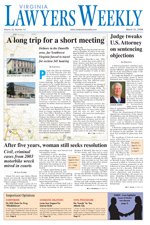Lawrence D. Wilder Jr., son of the Richmond mayor and former governor, pleaded guilty today to two misdemeanor counts related to his role as treasurer of his father’s gubernatorial campaign fund.
Richmond Circuit Judge Walter W. Stout III sentenced Larry Wilder to 12 months in jail, suspended, on each of the counts and fined him $1,000.
The younger Wilder, 45, pleaded guilty in federal court in 2000 to a misdemeanor count of possession of cocaine. The fund, which at one time had about $172,000 after the 1989 election, had dwindled to a few thousand dollars by then. Larry Wilder acknowledged that he was addicted to cocaine from 1992 to 1999.
Under state law at the time—since amended largely because of the case—money in a campaign fund essentially belonged to the candidate, and he was free to do with it as he pleased, so long as it went to charitable or political purposes or the candidate paid taxes on money he used for personal purposes.
Taxes on the money were paid as part of the resolution of the federal case, and the Wilder family thought the matter was over, according to James W. Morris III, who represented Larry Wilder.
However, an internal audit performed by the Virginia Board of Elections in 2004 disclosed that no campaign finance report had been filed since Jan. 15, 1999. Paul Goldman, a former political confidant of the mayor, was named treasurer of the campaign and reported that only about $3,000 was left. Goldman disclaimed any knowledge of what might have happened to the money.
The board referred the matter to Commonwealth’s Attorney David M. Hicks in September 2005, who did nothing on it until Michael N. Herring replaced him the following January.
Herring said he asked for access to the federal investigation documents and finally received them this March. He had Chris Bullard, a top assistant, and Lynchburg Commonwealth’s Attorney Michael R. Doucette review those materials for possible prosecution.
Because Larry Wilder had authority to spend the money as treasurer of the fund, a felony theft charge could have been prosecuted only with testimony from his father that he had used it for an improper or illegal purpose, Herring said.
Herring said he used the possibility of the felony charge as leverage to get an acknowledgement of wrongdoing from Larry Wilder, which required the waiver of the statute of limitations for misdemeanor offenses.
“Any trial of this would have become protracted and ugly,” Herring said. With the resolution of the case, “I am relieved beyond all description, primarily because it used a disproportionate amount of time.”
Friday, August 10, 2007
Subscribe to:
Post Comments (Atom)

No comments:
Post a Comment